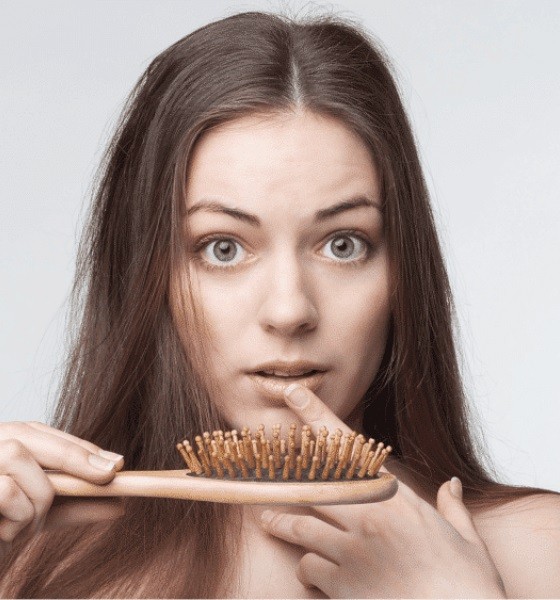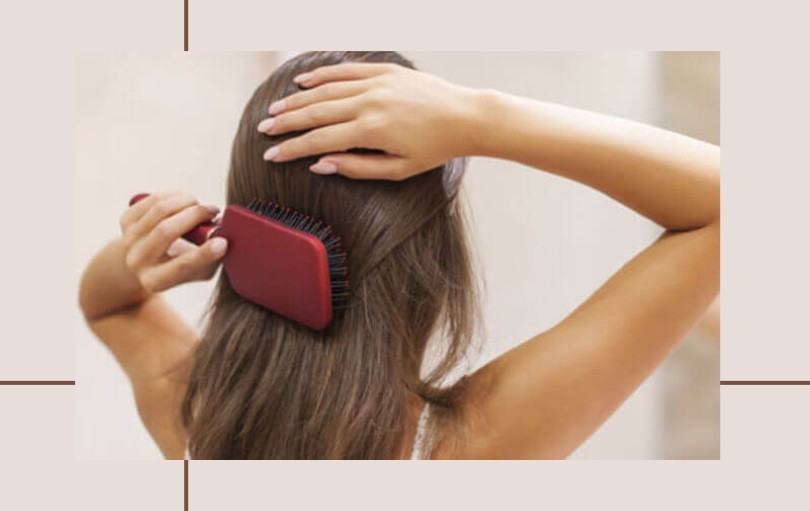Last Updated on March 28, 2025
Ashwagandha does not cause hair loss. It is a popular herb known for its potential hair growth benefits.
Ashwagandha is an ancient medicinal herb that has been used for centuries in Ayurvedic medicine. It is known for its adaptogenic properties, which help the body cope with stress. While stress is a common cause of hair loss, ashwagandha can actually help reduce stress levels and promote overall well-being, which may indirectly help prevent hair loss.
Ashwagandha is believed to improve blood circulation, which can also benefit the scalp and promote hair growth. It’s important to note that individual results may vary and it’s always best to consult with a healthcare professional before starting any new supplement or treatment for hair loss.
The Benefits Of Ashwagandha
Ashwagandha, also known as Withania somnifera, is a popular herb used in traditional medicine. It has been widely used for centuries due to its potential health benefits. Let’s explore the historical use and various benefits associated with ashwagandha.
Ashwagandha’S Historical Use
- Ashwagandha, meaning “smell of a horse” in Sanskrit, derives its name from its roots’ unique odor believed to resemble that of a horse.
- In traditional Ayurvedic medicine, ashwagandha has been used for centuries to promote overall well-being and vitality.
- Ayurvedic practitioners utilized ashwagandha to help balance the body and mind, reduce stress levels, and support general health.
Ashwagandha Health Benefits
- Stress relief and mental well-being: Ashwagandha is known as an adaptogenic herb, meaning it helps the body adapt to stress and promotes a sense of calmness. It is believed to help reduce cortisol levels, the stress hormone, leading to improved mental well-being.
- Enhanced immune function: Research suggests that ashwagandha may possess immune-stimulating properties that could help strengthen the immune system and enhance its ability to fight against infections and diseases.
- Support for hormonal balance: Ashwagandha is believed to have hormone-balancing effects. It may help regulate hormone levels in both men and women, potentially benefiting reproductive health and overall hormonal balance.
- Improved cognitive function: Preliminary studies indicate that ashwagandha may have neuroprotective properties, promoting healthy brain function and potentially enhancing memory, focus, and overall cognitive abilities.
- Increased physical endurance: According to some research, ashwagandha supplementation might enhance physical performance by improving energy levels, reducing exercise-induced muscle damage, and increasing strength and endurance.
- Potential anti-inflammatory effects: Certain compounds found in ashwagandha, such as withanolides, have demonstrated anti-inflammatory properties, which may help reduce inflammation and support overall joint and muscle health.
- Support for healthy sleep: Ashwagandha is known to have soothing properties that may aid in promoting better sleep quality and alleviating insomnia symptoms.
- Potential benefits for sexual health: In ayurvedic medicine, ashwagandha has been used as an aphrodisiac and to support sexual health in both men and women.
- Antioxidant properties: Ashwagandha is rich in antioxidants, which can help protect the body against oxidative stress and damage caused by free radicals.
Incorporating ashwagandha into your wellness routine may offer a variety of potential benefits for your overall health and well-being. However, it’s essential to consult with your healthcare provider before starting any new supplement or herbal remedy to ensure it is safe and suitable for you.
Remember, ashwagandha is not a miracle cure for any specific condition, and individual results may vary. It’s always best to approach herbal supplements as a part of a holistic approach to health and wellness.
Does Ashwagandha Cause Hair Loss?

Ashwagandha, an ancient medicinal herb often used in traditional ayurvedic medicine, has gained popularity in recent years for its potential health benefits. One concern that some people have is whether ashwagandha can actually cause hair loss. In this section, we will examine the scientific evidence, assess potential contributing factors to hair loss, and discuss studies that explore the impact of ashwagandha on hair health.
Examining The Scientific Evidence
- Several studies have investigated the effects of ashwagandha on hair loss, providing valuable insights into the topic:
- A study published in the Journal of Ethnopharmacology found that ashwagandha extract stimulated hair growth in mice by promoting the proliferation of hair follicles.
- Another study published in the Journal of cosmetic dermatology evaluated the efficacy of a herbal hair oil containing ashwagandha. The results showed significant improvements in hair growth and thickness.
Assessing The Potential Factors
- Hair loss can result from various factors, including genetics, hormonal imbalances, nutritional deficiencies, and stress. It is crucial to consider these factors when exploring the impact of ashwagandha on hair health.
Discussing Studies That Explore The Impact Of Ashwagandha
- A study published in the Journal of Ayurveda and integrative medicine examined the effects of an ashwagandha-based herbal formula on patients experiencing hair loss. The findings revealed a significant reduction in hair shedding and improved hair density.
- Another study published in the international journal of Trichology investigated the efficacy of a topical formulation containing ashwagandha for hair growth. The results indicated a significant increase in hair count and thickness.
While further research is needed to fully understand the mechanisms underlying the effects of ashwagandha on hair health, existing studies suggest that ashwagandha may potentially promote hair growth and reduce hair loss. It is essential to consult with a healthcare professional and consider various factors contributing to hair loss before incorporating ashwagandha into your hair care routine.
How Ashwagandha May Support Hair Growth?

Ashwagandha, an ancient Ayurvedic herb, has gained popularity in recent years for its potential health benefits. Among its many touted effects, one area of interest is its impact on hair health. We will explore the question of whether or not ashwagandha causes hair loss.
Specifically, we will focus on understanding the possible mechanisms through which ashwagandha may actually support hair growth. So, let’s dive in!
Ashwagandha’S Potential Role In Reducing Stress And Anxiety:
- Ashwagandha is known as an adaptogen, which means it may help the body manage and adapt to stress.
- Chronic stress and anxiety can contribute to hair loss by disrupting the hair growth cycle and promoting inflammation in the scalp.
- Ashwagandha may help reduce stress and anxiety levels, potentially minimizing their negative impact on hair health.
- By promoting a sense of calm and relaxation, ashwagandha could indirectly support hair growth.
The Effects Of Stress On Hair Loss:
- When the body is under chronic stress, it can lead to increased production of stress hormones, such as cortisol.
- Chronically elevated cortisol levels can disrupt the normal hair growth cycle, causing hair follicles to enter a resting phase and eventually leading to hair loss.
- Stress can also contribute to inflammation in the scalp, further compromising hair health.
- By reducing stress levels, ashwagandha may help prevent or minimize hair loss caused by stress-induced hormonal imbalances.
The Impact Of Ashwagandha On Hormonal Balance And Hair Health:
- Hormonal imbalances, such as elevated androgens (male hormones) or disrupted thyroid function, can contribute to hair loss.
- Ashwagandha has been found to have anti-androgenic properties, meaning it may help regulate hormone levels and prevent excess androgens from negatively affecting hair follicles.
- Additionally, ashwagandha has been shown to support thyroid function, which is crucial for maintaining healthy hair growth.
- By promoting hormonal balance, ashwagandha could have a positive impact on hair health and potentially reduce the risk of hair loss.
While there is no concrete evidence to suggest that ashwagandha causes hair loss, it may actually support hair growth through its potential stress-reducing and hormone-balancing effects. By helping the body manage stress, promoting hormonal balance, and reducing inflammation, ashwagandha could indirectly contribute to maintaining healthy and vibrant hair.
As always, it’s essential to consult with a healthcare professional before incorporating any new supplements into your routine, especially if you have pre-existing medical conditions or are taking medication.
Examining Potential Side Effects And Precautions
Ashwagandha is an ancient medicinal herb that has gained popularity in recent years for its potential health benefits. One of the concerns that arise when considering the use of this herb is whether it can cause hair loss. In this section, we will examine potential side effects and precautions associated with ashwagandha consumption.
Common Side Effects Associated With Ashwagandha Consumption

Ashwagandha is generally considered safe when consumed in appropriate doses. However, like any supplement or herbal remedy, it may cause side effects in certain individuals. Here are some common side effects that have been associated with ashwagandha consumption:
- Digestive disturbances: Some people may experience an upset stomach, diarrhea, or nausea when taking ashwagandha.
- Drowsiness: Ashwagandha has been reported to have a calming effect on the central nervous system, which may lead to drowsiness or sedation in some individuals.
- Allergic reactions: Although rare, some people may be allergic to ashwagandha, leading to symptoms such as itching, rash, or difficulty breathing.
It is important to note that these side effects are generally mild and temporary. If you experience any of these symptoms, it is recommended to discontinue use and consult a healthcare professional.
The Importance Of Proper Dosage And Usage
To minimize the risk of side effects, it is crucial to follow the recommended dosage and usage guidelines for ashwagandha. Here are some key points to consider:
- Start with a low dose: If you are new to ashwagandha, it is advisable to begin with a low dose and gradually increase it as tolerated. This can help your body adjust to the herb and minimize the likelihood of adverse reactions.
- Consult a healthcare professional: If you have any underlying health conditions or are taking medications, it is important to seek guidance from a healthcare professional before incorporating ashwagandha into your routine. They can provide personalized advice and ensure it does not interfere with any existing treatments.
- Follow manufacturer instructions: Always read and follow the instructions provided by the manufacturer or healthcare professional regarding the dosage and usage of ashwagandha supplements.
- Be mindful of potential interactions: Ashwagandha may interact with certain medications or health conditions. It is essential to inform your healthcare provider about all the medications you are taking or any underlying health conditions you have before starting ashwagandha.
By adhering to proper dosage and usage guidelines, you can support the safe and effective use of ashwagandha while minimizing the risk of potential side effects.
Potential Interactions With Medications Or Existing Health Conditions
While ashwagandha is generally safe, it is important to be aware of potential interactions with medications or existing health conditions. Here are some points to consider:
- Medication interactions: Ashwagandha may interact with medications such as sedatives, medications for anxiety or depression, or immune-suppressing drugs. It is advisable to consult a healthcare professional before using ashwagandha if you are taking any of these medications.
- Thyroid conditions: Ashwagandha has been shown to have potential effects on thyroid function. If you have a thyroid condition or are taking medication for it, it is essential to consult with your healthcare provider before incorporating ashwagandha into your routine.
- Autoimmune diseases: Ashwagandha may stimulate the immune system, which could potentially worsen symptoms in individuals with autoimmune diseases, such as rheumatoid arthritis or lupus. Consultation with a healthcare professional is recommended in such cases.
Overall, while side effects from ashwagandha are generally rare and mild, it is essential to be mindful of potential interactions and any pre-existing health conditions. By following proper usage guidelines and seeking professional advice when needed, you can ensure a safe and beneficial experience with ashwagandha.
Best Practices For Using Ashwagandha For Hair Health

Ashwagandha, a popular adaptogenic herb in traditional ayurvedic medicine, has gained attention for its potential benefits in promoting hair health. If you’re considering incorporating ashwagandha into your hair care routine, here are some best practices to keep in mind:
Consultation With A Healthcare Provider:
Before deciding to use ashwagandha for hair health, it is recommended to consult with a healthcare provider, especially if you have any pre-existing medical conditions or are taking medications. They can provide personalized guidance and ensure that Ashwagandha is safe and suitable for you.
Incorporating Ashwagandha Into A Well-Rounded Hair Care Routine:
While ashwagandha alone may not be a magic solution for hair loss, including it as part of a comprehensive hair care routine may yield better results. Consider the following practices:
- Take ashwagandha supplements: Look for high-quality ashwagandha supplements that contain standardized extracts for consistent dosage. Follow the recommended dosage instructions provided by the manufacturer.
- Maintain a balanced diet: A nutritious diet rich in vitamins, minerals, and proteins is crucial for promoting healthy hair growth. Pair ashwagandha supplementation with a well-balanced diet that includes plenty of fruits, vegetables, whole grains, lean proteins, and healthy fats.
- Follow a hair care regimen: Care for your hair by washing it regularly with a mild shampoo and conditioner. Avoid excessive heat styling and use gentle hair care products suitable for your hair type. Regularly trim your hair to prevent split ends and promote healthy growth.
- Manage stress levels: Ashwagandha is renowned for its stress-reducing properties. Since stress can contribute to hair loss, incorporating stress management techniques such as meditation, exercise, and adequate sleep into your routine may complement the effects of ashwagandha.
Complementing Ashwagandha With Other Hair Growth-Promoting Practices:
While ashwagandha may provide potential benefits for hair health, it’s important to remember that it’s not a standalone solution. Consider these practices to maximize their effectiveness:
- Scalp massage: Stimulate blood circulation to the hair follicles by gently massaging your scalp. You can use your fingertips or a scalp massager for a few minutes each day.
- Use hair growth-promoting oils: Some oils, such as coconut oil, argan oil, and castor oil, are believed to promote hair growth. Consider incorporating these oils into your hair care routine as a treatment or as an ingredient in DIY hair masks.
- Avoid excessive heat and chemical treatments: Frequent use of heat styling tools, such as flat irons and curling wands, as well as harsh chemical treatments like perming and coloring, can damage and weaken the hair. Minimize their use or opt for safer alternatives whenever possible.
- Protect your hair from environmental stressors: Shield your hair from excessive sun exposure, pollution, and harsh weather conditions. Wear a hat or use uv protection products to reduce the damaging effects of the environment on your hair.
Maintaining overall hair health requires a multifaceted approach. While ashwagandha may offer potential benefits, it’s essential to combine it with a well-rounded hair care regimen, consult with a healthcare provider, and consider other hair growth-promoting practices for optimal results.
Frequently Asked Questions
Does Ashwagandha Cause Hair Loss?
No, ashwagandha does not cause hair loss. In fact, it may actually help promote hair growth.
Can Ashwagandha Treat Hair Loss?
While ashwagandha has been used as a traditional remedy for hair loss, more research is needed to confirm its effectiveness.
How Does Ashwagandha Help With Hair Loss?
Ashwagandha may help with hair loss by reducing stress, supporting hormonal balance, and increasing blood circulation to the scalp.
How Long Does It Take For Ashwagandha To Show Results For Hair Loss?
The time it takes to see results from ashwagandha for hair loss may vary. It is recommended to use it consistently for at least a few months.
Are There Any Side Effects Of Using Ashwagandha For Hair Loss?
Ashwagandha is generally well-tolerated, but some people may experience digestive issues or allergic reactions. It’s always best to consult with a healthcare professional before using any new supplement.
Conclusion
To sum it up, after carefully examining the available research, it can be concluded that there is no substantial evidence to suggest that ashwagandha causes hair loss. While some anecdotal reports may claim otherwise, it is important to note that individual experiences can vary significantly.
As a natural herb, ashwagandha has been used for centuries in traditional Ayurvedic medicine and is generally considered safe for consumption. In fact, it is often praised for its potential to promote hair growth by reducing stress and anxiety levels, which are known contributing factors to hair loss.
However, as with any supplement or medication, it is advisable to consult with a healthcare professional before incorporating ashwagandha or any other herbal remedy into your routine. By doing so, you can ensure that it aligns with your specific needs and health condition.
Remember, everyone’s body is unique, and what works for one person may not work for another. So, it is always best to prioritize your well-being and make informed decisions based on reliable information.

